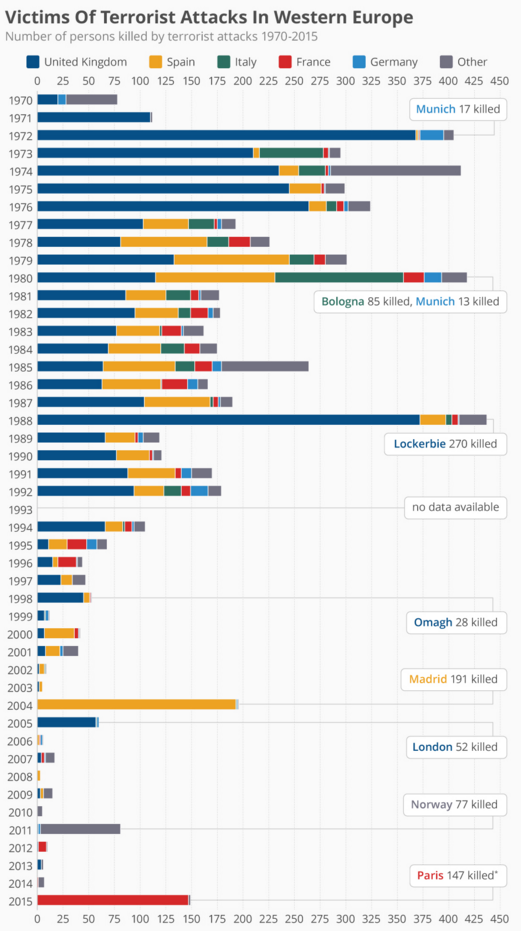Because I focus on economics, and because I don’t agree with Obama on many economic issues, I often end up being critical of his policies. (Although less critical than most conservatives; for instance I thought Obamacare was mostly a missed opportunity.) But this WSJ story made me appreciate Obama’s cool, cerebral style:
Tuesday’s coordinated terrorist attacks in Brussels have left at least 30 people dead and more than 200 wounded, shut down the capital of Europe and raised security alarms from Frankfurt to London to New York. (See above.) So maybe it’s time we all get over our inordinate fear of Islamist terrorism.
Believe it or not, that’s the not-so-subliminal message we keep hearing from President Obama, even as he condemned the attacks during his visit to Cuba. “Obama frequently reminds his staff that terrorism takes far fewer lives in America than handguns, car accidents and falls in bathtubs do,” reports Jeffrey Goldberg in a lengthy profile of the President’s national-security thinking in the Atlantic magazine. Islamic State, Mr. Obama is quoted as telling adviser Valerie Jarrett, is “not coming here to chop our heads off.”
When I first started to closely follow public affairs (in the 1970s), right-wingers seemed more rational, whereas the left frequently seemed to ignore cold hard logic, as when considering the costs and benefits of EPA or OSHA regulations. The WSJ editorial page would tell us “Yes, this EPA regulation will save 15 lives, but at a cost of 3 billion dollars. Not worth it.” Now things almost seem to have reversed. Now conservatives increasingly seem to rely on the “reptilian brain” (and a leading GOP candidate who will not be named (to avoid a horror show in the comment section) seems to rely on almost nothing but his reptilian brain.)
Some commenters will tell me that even if (objectively) terrorism is not a big problem for the West, fear of terrorism creates bad policies. I agree, but that fear is fixed in quantity. Triple the annual number of deaths from terror, or cut them by 2/3rds, and it has no effect on the level of fear. (Perhaps there is a homeopathy analogy here.) America has had almost no problem with Islamic terror in the past decade (just two sizable attacks in the US, AFAIK), and yet the hysteria is just as bad as ever. Jet travel is 10 times safer than in the 1960s, but people are just as terrified of flying as in the 1960s. I feel safer in a car, in my reptilian brain, even though my rational side knows I’m in much more danger.
So while terrorism leads to bad things like NSA overreach, and the Keystone cops antics of the TSA, we can’t prevent that problem by stopping terrorist attacks. We’ll never get the attacks down to zero, meaning we’ll always be petrified of terror. Our brains want to be terrified; if it’s not one thing, it will be another. In the 1950s it was the Cold War.
After I wrote this, Tyler Cowen directed me to some data on the amount of terrorism in Europe. Notice that as more Muslims have moved to Europe, the rate of terrorism seems to have declined:
Even if you just focus on Islamic terrorism, which can strike unexpectedly at any place, the 1980s were worse than the 1990s, the 2000s, or the 2010s. And yet the fear is greater than ever.
When I was young, I recall WWII vets saying that Vietnam was no big deal; the death toll was barely a 10th of WWII. And the Iraq War’s death toll for Americans was less than a 10th of Vietnam. Yet many pundits viewed Iraq as America’s greatest foreign policy disaster. Each year, unnecessary deaths bother us more than they did the year before. This trend has been going on for decades, and will continue until some huge catastrophe once again makes us numb to massive death totals.
I hope we keep becoming softer.
PS. I just noticed that David Henderson also has a post praising Obama, very much worth reading. I wonder if Obama will end up being like Clinton, where (after the fact) we realize that things could have been much worse, and eventually did become much worse. Let’s hope not.
PPS. To say that terrorism is not now a major problem in America or Europe, is not the same as saying it’s a problem to be ignored. It’s quite possible that it will become a major problem in the future. I’m agnostic on the proper response to ISIS, for example.
